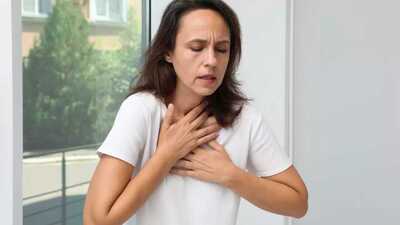Heart attacks remain one of the leading causes of death worldwide, and what makes them so dangerous is how easily their warning signs can be overlooked. Many people assume chest discomfort or fatigue is just stress, heartburn, or exhaustion, and decide to “wait it out.”
But experts say that hesitation can be deadly. A heart attack happens when blood flow to the heart muscle is blocked, depriving it of oxygen. Within minutes, that tissue begins to die, and any delay in treatment can cause lasting damage.
While medical advances have reduced death rates, heart attacks still affect millions every year, often striking without dramatic warning. The symptoms can vary from mild to severe, and not everyone experiences them the same way. Recognizing the early signs and acting immediately could be the difference between life and death. Here’s what doctors say you should never ignore.
Chest pain or pressure
The most common warning sign is chest pain- a heavy, squeezing, or full feeling in the center of the chest. Some describe it as “an elephant sitting on the chest.” The discomfort may last several minutes or come and go. While it can feel like heartburn, chest pain related to a heart attack usually feels tighter and more intense. If you feel new or unusual pressure that doesn’t go away quickly, don’t ignore it.
 Pain in the jaw, neck, back, or arms
Pain in the jaw, neck, back, or arms
Chest pain often spreads beyond the chest. You might feel it radiating into your jaw, neck, shoulders, or one or both arms- especially the left arm. It can also travel to your upper back. This pain is typically described as pressure or tightness, not a sharp stab.
Shortness of breath
When the heart can’t pump properly, fluid can build up in the lungs, leading to sudden breathlessness. You might find yourself gasping for air even while sitting still or resting. This symptom can appear with or without chest pain. If you feel short of breath, dizzy, or unable to take a deep breath for no clear reason, don’t assume it’s just fatigue or anxiety- it could be a red flag for a heart problem.
Fatigue, nausea, or lightheadedness
Heart attacks don’t always start with chest pain. Some people feel extreme fatigue or weakness for days before the event. Others experience nausea, dizziness, or a cold, clammy sweat. You might also feel a vague sense of anxiety or dread that something is wrong. These subtle signs are easy to miss- especially in women, who often experience less obvious symptoms.

Silent or atypical heart attacks
Not all heart attacks announce themselves loudly. Some are “silent,” showing no symptoms or only mild signs that people dismiss as indigestion or the flu. The damage to the heart is discovered later through tests. Experts estimate that one in five heart attacks falls into this category. That’s why any unexplained or persistent discomfort, no matter how small, deserves attention.
But experts say that hesitation can be deadly. A heart attack happens when blood flow to the heart muscle is blocked, depriving it of oxygen. Within minutes, that tissue begins to die, and any delay in treatment can cause lasting damage.
While medical advances have reduced death rates, heart attacks still affect millions every year, often striking without dramatic warning. The symptoms can vary from mild to severe, and not everyone experiences them the same way. Recognizing the early signs and acting immediately could be the difference between life and death. Here’s what doctors say you should never ignore.
Chest pain or pressure
The most common warning sign is chest pain- a heavy, squeezing, or full feeling in the center of the chest. Some describe it as “an elephant sitting on the chest.” The discomfort may last several minutes or come and go. While it can feel like heartburn, chest pain related to a heart attack usually feels tighter and more intense. If you feel new or unusual pressure that doesn’t go away quickly, don’t ignore it.
Chest pain often spreads beyond the chest. You might feel it radiating into your jaw, neck, shoulders, or one or both arms- especially the left arm. It can also travel to your upper back. This pain is typically described as pressure or tightness, not a sharp stab.
Shortness of breath
When the heart can’t pump properly, fluid can build up in the lungs, leading to sudden breathlessness. You might find yourself gasping for air even while sitting still or resting. This symptom can appear with or without chest pain. If you feel short of breath, dizzy, or unable to take a deep breath for no clear reason, don’t assume it’s just fatigue or anxiety- it could be a red flag for a heart problem.
Fatigue, nausea, or lightheadedness
Heart attacks don’t always start with chest pain. Some people feel extreme fatigue or weakness for days before the event. Others experience nausea, dizziness, or a cold, clammy sweat. You might also feel a vague sense of anxiety or dread that something is wrong. These subtle signs are easy to miss- especially in women, who often experience less obvious symptoms.

Silent or atypical heart attacks
Not all heart attacks announce themselves loudly. Some are “silent,” showing no symptoms or only mild signs that people dismiss as indigestion or the flu. The damage to the heart is discovered later through tests. Experts estimate that one in five heart attacks falls into this category. That’s why any unexplained or persistent discomfort, no matter how small, deserves attention.
You may also like

Lisa Hogan flooded with support as she shares huge Clarkson's Farm problem

"Five arrested in Durgapur gangrape case": Asansol-Durgapur CP Sunil Kumar Choudhary

'You don't mind right?': Trump calls Meloni 'beautiful young woman' in Gaza peace summit - Watch

Luke Littler's perfect response to fan's slur at Beau Greaves after she beats him

Mahagathbandhan constituents seek to resolve seat-sharing stalemate, Jan Suraaj releases second list for Bihar polls





